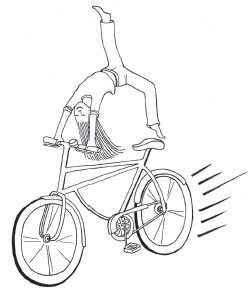


A traveller must have the backe of an asse to beare all, a tung like the taile of a dog to flatter all, the mouth of a hogge to eate what is set before him, the eare of a merchant to heare all and say nothing
(1594)
Going for a walk is the quintessential English form of relaxation; but there are many varieties within the basic idea of putting one foot in front of another…
mantle (Lincolnshire) to walk aimlessly up and down with short steps
starp (North East) to walk with long strides
footer-footer (Scotland 1894) to walk in an affected mincing manner
nuddle (Suffolk) to walk alone with the head held low
slochet (Bedfordshire 1809) to walk with shoes nearly falling off the feet
festination (1878) walking faster and faster involuntarily
… and sometimes it can all seem a bit too much:
pouff (Banffshire) the act of walking with a heavy step, especially through weariness
plout (North East) to struggle to walk
surbater (1633) someone who tires another person out by walking
hox (Gloucestershire) to knock the feet together while walking
dot and go one (b.1811) to waddle: of people with one leg shorter than the other
darby-roll (19C) a style of walking that betrays an individual’s experience of fetters and thus time spent in prison
So why not take up that efficient, ecological and highly fashionable way of getting around – just be sure not to flirt with its dangers:
croggie (UK school slang 2003) a ride of the crossbar or handlebars of another rider’s bicycle
blackadder (West Scotland playground slang) the action of allowing a bike to continue its journey without a rider (usually performed at the top of hills on either old, borrowed or stolen bikes)
endo (US slang San Francisco 1987) a bicycling accident in which the rider is thrown over the handlebars
SMIDSY (cyclists’ acronym) Sorry Mate, I Didn’t See You
acrobrat (UK playground slang 1970s) a kid who attaches poles to the front axle of his bike so he can bounce up and down on the front wheel

Once upon a time more substantial vehicles moved slowly and with difficulty:
unicorn (1785) a coach drawn by three horses, two abreast and one in the lead
timwhisky (1764) a light carriage for one or two people, pulled by one or two horses
quarter (Shropshire) to drive a cart in a lane with deep ruts, in such a way as to keep each wheel clear of them
to hunt the squirrel (18C) for two coachmen to attempt to upset each other’s vehicles as they race along a public road (veering from side to side like a frightened squirrel)
Now the opposite is too often the case:
garyboy (East Anglia slang 1995) a male who drives a car usually noticeable by its sporty appearance and souped up engine
swoop and squat (US slang 2005) to pull in front of another vehicle and slam on the brakes, deliberately causing an accident to collect the insurance money
chawbuckswar (Anglo-Indian) a rough rider
Not that you need to have your own transport to get around:
fly canaries (underworld slang 1945) to pass off used tram tickets as new ones
monkey board (mid 19C) the step on the bus on which the conductor stands
hong! and midor! (UK transport workers’ jargon) ‘hurry along’ and ‘mind the doors’
Cinderella fare (US cabdrivers’ slang) people left behind on the platform when the last train leaves late at night
Let’s not forget those who are happy just to watch. Trainspotters may be mocked by the outside world, but they don’t take criticism lying down: the language of gricing is notable for its acidic descriptions of outsiders.
bert the majority of people on trains, only interested in getting from A to B
insects occasional railway enthusiasts who swarm at certain times of year
kettle basher someone obsessed with steam engines (looked on as an effete sentimentalist)
baglet a woman, generally looked upon with unfriendliness. Gricers are invariably male. Worst of all women is The Baglet – Lady Thatcher, whose reluctance to travel by train was legendary and who set the privatization of British Rail in progress
Hopefully you will arrive safely at your destination. Though some places, traditionally, have been more euphemistic than real. You could go to…
Jericho (late 18C) to become drunk
Bath (mid 17C) to take up life as a beggar
Chicago (US late 19C) to run away, especially to avoid one’s debts
Copenhagen (1950s) to have a sex operation
the Bahamas (US slang) to be sent to solitary confinement
Peckham (early 19 C) to sit down to eat
